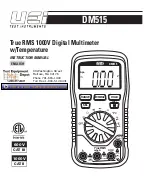
4
Änderungen vorbehalten / Subject to change without notice
General information regarding the CE marking
HAMEG instruments fulfill the regulations of the EMC directive. The conformity test made
by HAMEG is based on the actual generic- and product standards. In cases where different
limit values are applicable, HAMEG applies the severer standard. For emission the limits for
residential, commercial and light industry are applied. Regarding the immunity (susceptibility)
the limits for industrial environment have been used.
The measuring- and data lines of the instrument have much influence on emmission and
immunity and therefore on meeting the acceptance limits. For different applications the lines
and/or cables used may be different. For measurement operation the following hints and
conditions regarding emission and immunity should be observed:
1. Data cables
For the connection between instruments resp. their interfaces and external devices, (computer,
printer etc.) sufficiently screened cables must be used. Without a special instruction in the
manual for a reduced cable length, the maximum cable length of a dataline must be less than
3 meters long. If an interface has several connectors only one connector must have a
connection to a cable.
Basically interconnections must have a double screening. For IEEE-bus purposes the double
screened cables HZ72S and HZ72L from HAMEG are suitable.
2. Signal cables
Basically test leads for signal interconnection between test point and instrument should be
as short as possible. Without instruction in the manual for a shorter length, signal lines must
be less than 3 meters long.
Signal lines must screened (coaxial cable - RG58/U). A proper ground connection is required.
In combination with signal generators double screened cables (RG223/U, RG214/U) must be
used.
3. Influence on measuring instruments.
Under the presence of strong high frequency electric or magnetic fields, even with careful
setup of the measuring equipment an influence of such signals is unavoidable.
This will not cause damage or put the instrument out of operation. Small deviations of the
measuring value (reading) exceeding the instruments specifications may result from such
conditions in individual cases.
December 1995
HAMEG GmbH




































